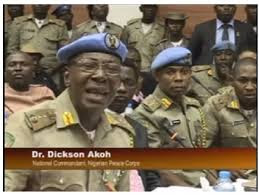The Federal Government on Wednesday arraigned the leader of a group, Peace Corps of Nigeria, Mr. Dickson Akor, on 90 charges, including money laundering and obtaining money under false pretences through extortion from innocent Nigerians.
The allegations involved about N1.2bn.
The Incorporated Trustees of Peace Corps of Nigeria was charged as the second defendant alongside Akor.
The group is seeking to transit to a government-owned paramilitary organisation.
A bill establishing it had been passed by the National Assembly and was waiting for the President’s accent before the group’s leader was arrested by the police and subsequently charged.
Akor pleaded not guilty to all the 90 charges when read to him before Justice John Tsoho of the Federal High Court in Abuja on Wednesday.
His “not guilty” plea was also recorded for the second defendant, corporate body.
The case marked, FHC/ABJ/CR/45/2017, was filed by the office of the Attorney-General of the Federation on March 14, 2017.
Shortly after the plea of the defendants were taken, the prosecuting counsel, Mr. Aminu Alilu, urged the court to give a date for commencement of trial and remand Akor in prison pending the trial.
In response, defence counsel, Mr. John Ochokwu, informed the judge that his client had filed a bail application.
The judge gave Ochokwu a go-ahead to move the bail application, which was opposed by the Alilu.
Justice Tsoho, after the hearing of the bail application, took a break to deliver his ruling.
The judge later returned to court room to grant bail to Akor in the sum of N10m with one surety, who must be an eminent personality and possess landed property in Abuja.
The judge also granted the bail sum of N20m to cover for the second defendant.
Among other bail conditions, Akor was by the court’s ruling, required to deposit with the court, his passport as well as other travelling documents, two recent passport photograph and a copy of the title documents of his proposed surety’s property.
The judge fixed May 23 for commencement of trial.
In count 1 to 32, Akor and PCN’s incorporated trustees were accused of converting money derived directly from extortion, contrary to Section 15(1)(a)(ii) of the Money Laundering (Prohibition) Act 2011 and punishable under the same section of the Act.
They were, in counts 33 to 42, accused of transferring money derived directly from extortion contrary to Section 15(1)(a)(ii) of the Money Laundering (Prohibition) Act 2011 and punishable under the same section of the Act.
In counts 43 to 75, they were accused of “obtaining money by false pretences contrary to Section 1(1)(a) of the Advance Fee Fraud and other fraud related offences Act, Cap A6 Laws of the Federation of Nigeria 2004 and punishable under the same section of the Act.”
They were, in count 76 to 85, accused of “laundering of funds obtained through unlawful activity contrary to Section 7(1)(b) of the Advance Fee Fraud and other fraud related offences Act, Cap A6 Laws of the Federation of Nigeria 2004 and punishable under the same section of the Act.”
The defendants were, in count 86, accused of “organising and training of members of Peace Corps of Nigeria as quasi-military organisation contrary to Section 6(1)(a) of the Public Order Act, P42 Laws of the Federation of Nigeria 2004 and punishable under the same section of the Act.”
In count 87, the defendants were accused of violating “provisions relating to wearing of uniforms contrary to Section 7(4)(a) of the Public Order Act, P42 Laws of the Federation of Nigeria 2004 and punishable under the same section of the Act.”
They are, in count 88, charged with “unauthorised display of flags contrary to Section 7(4)(b) of the Public Order Act, P42 Laws of the Federation of Nigeria 2004 and punishable under the same section of the Act.”
In count 89, they were charged with “operating as private guard without license contrary to Section 1(1) of the Private Guard Companies Act, Cap P30 Laws of Federation of Nigeria 2004 and punishable under Section 32(1) of the Act.
Akor of PCN’s incorporated trustees were, in count 90, charged with“unauthorised wearing of uniforms and other identification marks contrary to Section 24(1) of the Private Guard Companies Act, Cap P30 Laws of Federation of Nigeria 2004 and punishable under Section 32(1) of the Act.”
PUNCH
